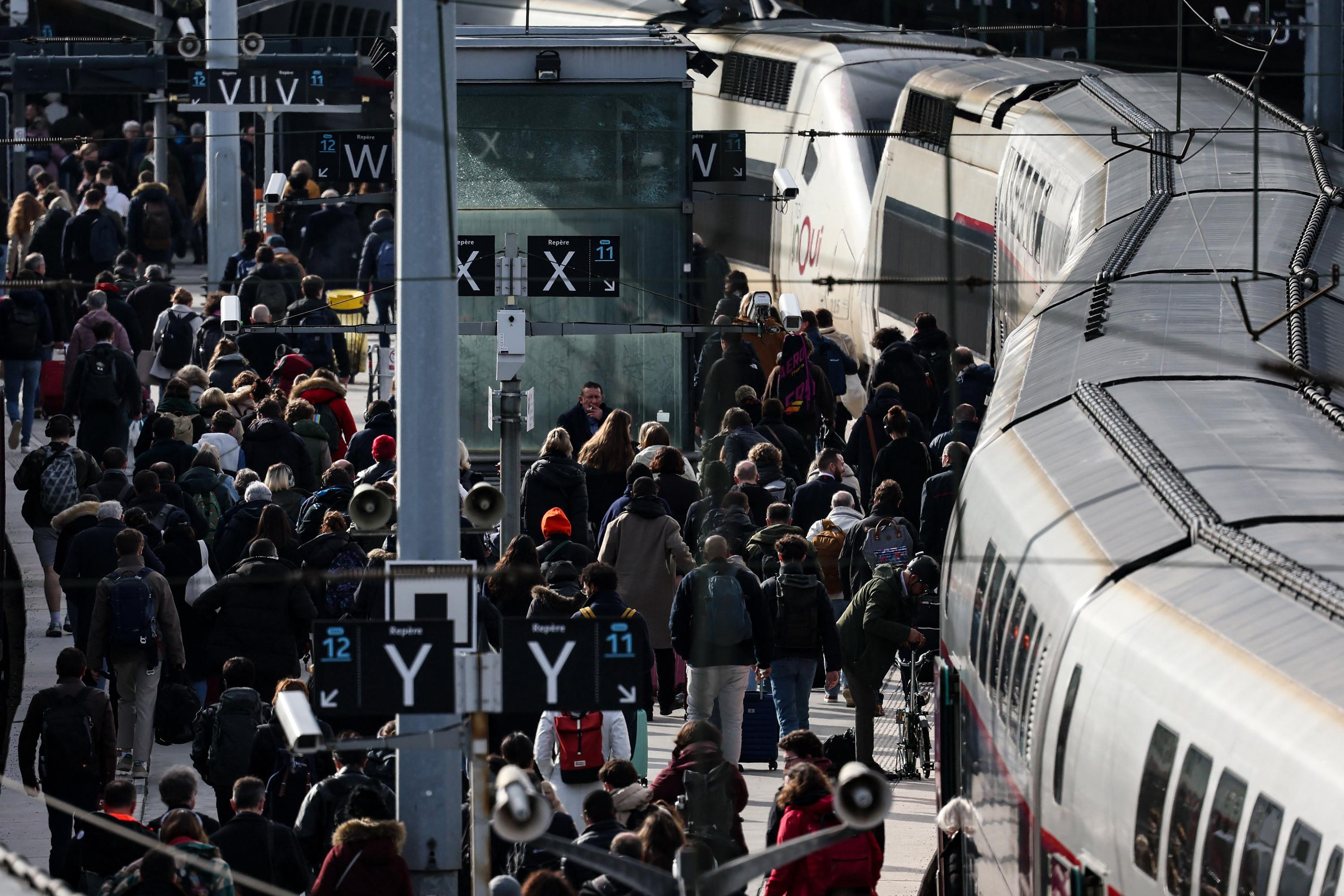School holidays, public holidays... Against the advice of the government, the Senate adopted on Tuesday a bill to limit strikes in transport during certain periods, sparking a very abrasive debate a few months before the Olympic Games. Necessary measures to “ensure continuity of service”, or “deliberate attacks on the right to strike”? The divisions were revived between the left, fiercely opposed to the text, and the senatorial majority of the right and the center, unsurprisingly managed to have it adopted by 211 votes against 112.
"Enough is enough. Our fellow citizens can't take it anymore,” launched the head of the centrist senators Hervé Marseille, author of this bill tabled in February, when at least 150,000 travelers had seen their departure on vacation disrupted by a mobilization of controllers of the SNCF. “Faced with excesses”, we must “reestablish a balance between the right to strike and continuity of service”, he added.
The text from the head of the UDI grants the government a quota of 30 days per year during which “public transport service personnel” – except the airline sector – would be deprived of their right to strike, with a limit of 7 days. 'affiliated by blackout period. These protected days would only concern certain periods: school holidays, public holidays, elections and referendums as well as events of “major importance”, such as the Olympic Games. And the ban on striking would be limited only to peak hours and to personnel essential to the operation of the service.
Also read “The controller was as lost as us”: on the Perpignan-Paris train, arriving late in Paris at 4:38 a.m.
“We say yes to the right to strike but no to the absolute blockade of an entire country,” said rapporteur Philippe Tabarot (Les Républicains). “It is not possible, during the Olympic Games, to take hostage thousands of French people who sacrificed themselves to buy tickets to attend the competitions,” justified his colleague Michel Savin, while several unions are threatening to mobilize during this period.
The text also plans to extend the deadline for declaring strikers from 48 to 72 hours, to increase the “minimum level of service” during peak hours with a requisition process under strict conditions, as well as a system for the lapse of certain notices not followed up, to combat “dormant notices” which sometimes last for several months.
Another measure voted on: that which requires employees wishing to strike to join the movement from the start of their service and not during the day. A way to fight against “59-minute strikes”, less costly for the employee but sources, according to the right, of great disorganization. This debate was reopened during the February school holidays, in particular by the widely commented declaration of Prime Minister Gabriel Attal who deplored a “form of habit” to strike during certain periods and affirmed that if “the strike is a right” , “working is a duty”.
Also read Paris-Clermont-Ferrand: this cursed SNCF line, “open wound” for users and local elected officials
But Transport Minister Patrice Vergriete ultimately opposed the text, questioning its conformity with the Constitution and refusing to "pit the French against each other, those who have the means to go on vacation against those who get up every day." mornings to go to work. This position risks complicating the chances of the text being included in the National Assembly in the short term. Some members of the presidential majority nevertheless voted for it, such as the Horizons senators who mostly sit in the Independents group, or their MoDem colleagues, affiliated with the centrist group. The Macronist group (RDPI) abstained.
The entire left opposed this text as a whole, without success. “Three months before the Olympics, it is a provocation which risks igniting the powder in a context of serious social crisis,” worried the communist Marie-Claude Varaillas. “The senatorial majority is trying to reappropriate the right to vacation in the name of the general interest,” added the socialist Olivier Jacquin, his ecologist colleague Guillaume Gontard denouncing for his part “a text which is clearly based on our Constitution and our history". In recent days, the CGT transports had also castigated the “outpouring of populism” of the senatorial majority, accusing it of wanting to “better serve the interests of capital”.

 Poland, big winner of European enlargement
Poland, big winner of European enlargement In Israel, step-by-step negotiations for a ceasefire in the Gaza Strip
In Israel, step-by-step negotiations for a ceasefire in the Gaza Strip BBVA ADRs fall almost 2% on Wall Street
BBVA ADRs fall almost 2% on Wall Street Ukraine has lost 10 million inhabitants since 2001... and could lose as many by 2050
Ukraine has lost 10 million inhabitants since 2001... and could lose as many by 2050 Sánchez cancels his agenda and considers resigning: "I need to stop and reflect"
Sánchez cancels his agenda and considers resigning: "I need to stop and reflect" The Federal Committee of the PSOE interrupts the event to take to the streets with the militants
The Federal Committee of the PSOE interrupts the event to take to the streets with the militants Repsol: "We want to lead generative AI to guarantee its benefits and avoid risks"
Repsol: "We want to lead generative AI to guarantee its benefits and avoid risks" Osteoarthritis: an innovation to improve its management
Osteoarthritis: an innovation to improve its management Ukraine gets a spokesperson generated by artificial intelligence
Ukraine gets a spokesperson generated by artificial intelligence The French will take advantage of the May bridges to explore France
The French will take advantage of the May bridges to explore France Organic flour contaminated by a recalled toxic plant
Organic flour contaminated by a recalled toxic plant 2024 Olympics: Parisian garbage collectors have filed a strike notice
2024 Olympics: Parisian garbage collectors have filed a strike notice Death of Paul Auster: Actes Sud says he is “lucky” to have been his publisher in France
Death of Paul Auster: Actes Sud says he is “lucky” to have been his publisher in France Lang Lang, the most French of Chinese pianists
Lang Lang, the most French of Chinese pianists Author of the “New York Trilogy”, American novelist Paul Auster has died at the age of 77
Author of the “New York Trilogy”, American novelist Paul Auster has died at the age of 77 To the End of the World, The Stolen Painting, Border Line... Films to watch this week
To the End of the World, The Stolen Painting, Border Line... Films to watch this week Omoda 7, another Chinese car that could be manufactured in Spain
Omoda 7, another Chinese car that could be manufactured in Spain BYD chooses CA Auto Bank as financial partner in Spain
BYD chooses CA Auto Bank as financial partner in Spain Tesla and Baidu sign key agreement to boost development of autonomous driving
Tesla and Baidu sign key agreement to boost development of autonomous driving Skoda Kodiaq 2024: a 'beast' plug-in hybrid SUV
Skoda Kodiaq 2024: a 'beast' plug-in hybrid SUV The home mortgage firm rises 3.8% in February and the average interest moderates to 3.33%
The home mortgage firm rises 3.8% in February and the average interest moderates to 3.33% This is how housing prices have changed in Spain in the last decade
This is how housing prices have changed in Spain in the last decade The home mortgage firm drops 10% in January and interest soars to 3.46%
The home mortgage firm drops 10% in January and interest soars to 3.46% The jewel of the Rocío de Nagüeles urbanization: a dream villa in Marbella
The jewel of the Rocío de Nagüeles urbanization: a dream villa in Marbella Europeans: a senior official on the National Rally list
Europeans: a senior official on the National Rally list Blockade of Sciences Po: the right denounces a “drift”, the government charges the rebels
Blockade of Sciences Po: the right denounces a “drift”, the government charges the rebels Even on a mission for NATO, the Charles-de-Gaulle remains under French control, Lecornu responds to Mélenchon
Even on a mission for NATO, the Charles-de-Gaulle remains under French control, Lecornu responds to Mélenchon “Deadly Europe”, “economic decline”, immigration… What to remember from Emmanuel Macron’s speech at the Sorbonne
“Deadly Europe”, “economic decline”, immigration… What to remember from Emmanuel Macron’s speech at the Sorbonne These French cities that will boycott the World Cup in Qatar
These French cities that will boycott the World Cup in Qatar Top 14: Fijian hooker Narisia leaves Racing 92 and signs for Oyonnax
Top 14: Fijian hooker Narisia leaves Racing 92 and signs for Oyonnax Europa League: Jean-Louis Gasset is “wary” of Atalanta, an “atypical team”
Europa League: Jean-Louis Gasset is “wary” of Atalanta, an “atypical team” Europa League: “I don’t believe it…”, Gasset jokes about Aubameyang’s age
Europa League: “I don’t believe it…”, Gasset jokes about Aubameyang’s age Foot: Rupture of the cruciate ligaments for Sergino Dest (PSV), absent until 2025
Foot: Rupture of the cruciate ligaments for Sergino Dest (PSV), absent until 2025
















